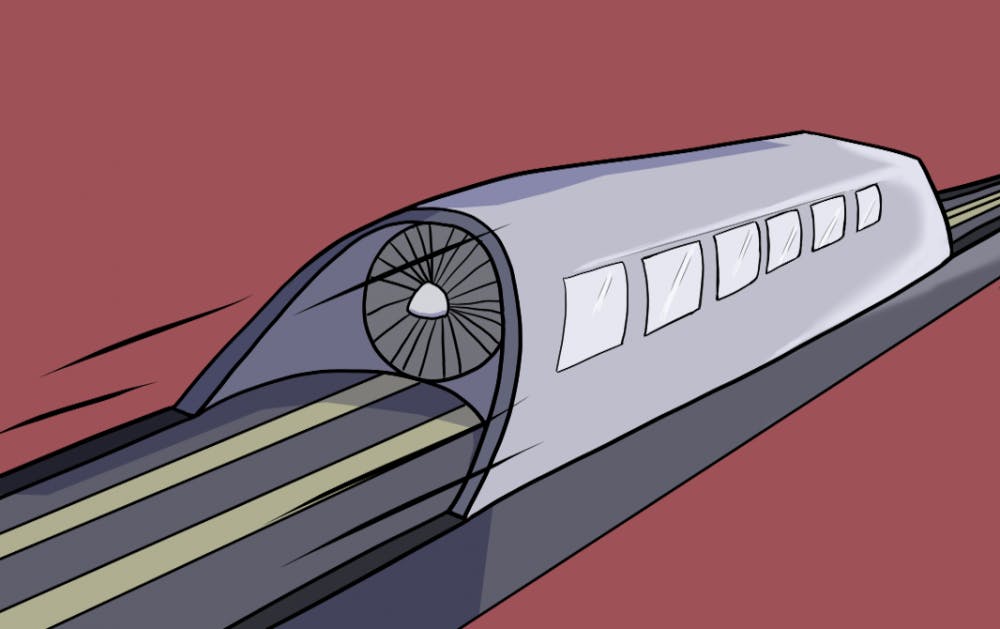AZLoop, the Hyperloop competition team comprised of students from ASU, NAU and Embry-Riddle Aeronautical University, is preparing for its next level of competition on July 22.
The event, hosted by Elon Musk at the SpaceX/Hyperloop headquarters, is an annual international competition featuring teams from around the world that contend to see which can build the best suited sub-scale prototype of a Hyperloop pod.
AZLoop took eighth place last year, but the team has goals of winning the competition this summer.
Read More: AZLoop shoots for the moon in SpaceX's Hyperloop competition
Hyperloop is Musk’s proposed "fifth form of transportation," with the intention of being able to transport people and cargo at airline speeds across land – for only a fraction of the cost. The Hyperloop pods, which would hold people or cargo, are designed to travel 750 mph and come to a complete stop in under 10 seconds.
Joshua Bowen, AZLoop team lead and an ASU alumnus, said the team’s edge this year comes from the facilities provided by ASU.
“We are one of, if not the, only team in the world that has a sustainable vacuum chamber and a 50-foot open air testing track,” Bowen said. “It’s something I don’t think a lot of other teams have, and we’re very blessed in that way.”
Bowen said the reason the team placed eighth out of the twenty teams last year was simply from lack of time.
If the team wins this year, Bowen said the team would like to turn AZLoop into a company rather than just a school-affiliated club.
“Last year, we were very successful as a first-year team,” Bowen said. “We got all the way through every single safety check, everything got positive scores all the way through the competition. It was simply that they didn’t have enough time for all the teams to run.”
Leann Scott, a mechanical engineering junior and material manufacturing team lead, said the team has just exited its design phase and is now moving to the building phase of the pod.
“We started designing for this competition back in September, right after the last competition,” Scott said. “We submitted our preliminary design back in November, then we kept refining until we submitted out final design package in January, since then we’ve been refining and simplifying, and in March we started testing.”
The AZLoop team is divided into three sub-teams: design, control and business. Each team has its own subsections, including propulsion, braking, levitation and stability. Madison Grayson, physics sophomore and mechanical co-lead/propulsion lead, said the hardest part the entire team has faced so far was submitting the final design package.
“The final design package was over 300 slides and the amount of analysis and design was pretty intricate and intensive,” Grayson said. “Once we go to competition weekend it will be difficult because there's a series of tests that SpaceX basically has us convening to finish before the other teams, so there's only about three teams running the final competition out of 20 teams that show up with pods.”
When it comes to the team's biggest competition, Scott said the teams that worry her the most this year are German team WARR and Dutch team Delft.
“We have a couple of winning teams coming back this year — WARR, the winner from last year's competition, is coming back as well, so we're a little wary of them,” Scott said. “There’s also Delft, one of the winners from the first Hyperloop competition (which) is also coming back, so those are the two we’re mostly keeping an eye on, the other ones we’re still concerned with, because they are competition after all.”
Elvis Leon, technological entrepreneurship and management sophomore and director of business development, said that winning would prove that the University should fund more projects like this.
"If we won, that'd be the greatest thing ever, and it would also show that schools should for sure fund more of these groups and allow students to participate in competitions like this that give them the hands-on opportunities to put to use what they're learning in the classroom," Leon said.
Bowen said that his favorite opportunity the team has been presented with is to work with the scientist behind the Hyperloop project.
“It's just a really cool thing to be working alongside so many fantastic engineers from around the world and all the different teams,” Bowen said. “As well as working with the SpaceX engineers to turn out something that's brand new technology, that's something that the team can be proud of.”
Reach the reporter at amville8@asu.edu or follow @AustinMVillegas on Twitter.
Like State Press on Facebook and follow @statepress on Twitter.




